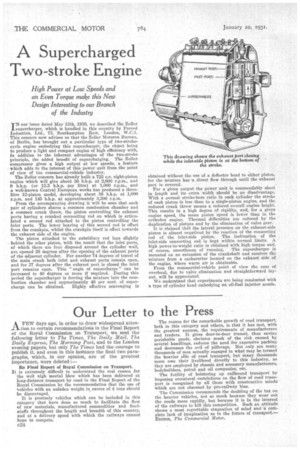Our Letter to the Press
Page 46

If you've noticed an error in this article please click here to report it so we can fix it.
AFEW days ago, in order to draw widespread attenon to certain recommendations in the Final Report of the Royal Commission on Transport, we sent the following letter to The Times, The Daily Mail, The Daily Express, The Morning Post, and to the London evening papers, but only The Times had the courage to publish it, and even in this instance the final two paragraphs, which, in our opinion, are of the greatest importance, were deleted :— Re Final Report of Royal Commission on Transport.
It is extremely difficult to understand the real reason for the well nigh mortal blow which has been delivered at long-distance transport by road in the Final Report of the Royal Commission by the recommendation that the use of vehicles with an unladen weight in excess of 4 tons should
be discouraged. '
It is precisely vehicles which can be included in this category that have done so much to facilitate the flow of raw materials, manufactured commodities and foodstuffs throughout the length and breadth of this country, and at a delivery speed with which the railways cannot hope to compete. The reason for the remarkable growth of road transport, both in this category and others, is that it has met, with the greatest success, the requirements of manufacturers and traders. It gives door-to-door transit, thus saving perishable goods, obviates much of the risk caused by several handlings, reduces the need for expensive packing and decreases the evil of pilferage. Not only are many thousands of men actually engaged in what may be termed the heavier side of road transport, but many thousands more owe their livelihood directly to this industry, as they are employed by chassis and accessory manufacturers, bodybuilders, petrol and oil companies, etc.
The futility of bolstering up railbound transport by imposing unnatural restrictions on the flow of road transport is recognized by all those with constructive minds' which are not obsessed by pro-railway bias.
The Commission recommends the doubling of the tax on the heavier vehicles, not so much because they wear out the roads more rapidly, but because it is in the interest of the railways to kill this competition. Such an attitude shows a most regrettable stagnation of mind and a complete lack of imagination as to the future of transport.— EDITOR, The Commercial Motor.












































































































